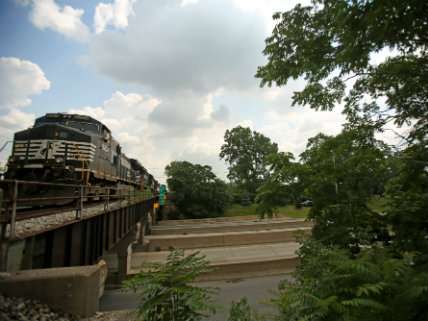A Day Trip to Dearborn, Michigan, Helps Puts Election Results in Perspective
Will the rest of America eventually converge with the coasts?


For some quick perspective on topics that are flaring in the aftermath of the presidential election—American manufacturing, bigotry, the difference between coastal elite America and flyover country, the environment—one can do a lot worse than a quick day trip to Dearborn, Michigan.
The Henry Ford museum offers tours of Ford Motor Co.'s Rouge factory, which now makes the Ford F-150 pickup truck, the best-selling vehicle in America. An introductory video describes the plant as "the most famous manufacturing facility ever constructed," a place where, back in the 20th century, Henry Ford pioneered and perfected both the moving assembly line and vertically integrated production, and where the workforce was once 100,000 strong.
Today, the plant runs nearly round-the-clock, seven days a week, but it employs closer to 6,000 people. Fewer workers can be more productive in part because they are assisted by robot arms and mechanical bolt-fasteners made by Fanuc and Kawasaki, which are based in Japan, by Leoni AG, which is a German company, and by Atlas Copco, which is headquartered in Sweden. Even American manufacturing, in other words, relies heavily on foreign trade.
For all his business genius, Henry Ford was a bigot whose newspaper, the Dearborn Independent, peddled vicious anti-Semitism and reprinted the "Protocols of the Elders of Zion"; Hitler honored him in 1938 with the Grand Cross of the German Eagle. Visit the Henry Ford museum today, though, and you will find within it one of the most inspiring exhibits anywhere devoted to civil rights. Its centerpiece is the actual Montgomery, Alabama, bus that Rosa Parks refused to move to the back of. As President Obama was fond of quoting Martin Luther King Jr., "The arc of the moral universe is long, but it bends towards justice."
Compared to, say, a Toyota Prius or a Chevy Volt, the Ford F-150 isn't exactly what you might describe as a low-environmental impact vehicle. But a $2 billion overhaul of the Rouge plant in 1999 means that a site where prosperity was once synonymous with pollution now features an apple orchard, beehives, mallard ducks, a "green roof," photovoltaic cells, skylights, and cisterns that recycle rainwater. Tour guides explain that many of these features reduce energy costs and were driven not by government mandates but by economic efficiency incentives. It's something to consider amid the anxiety about the effect a Trump administration will have on the environment.
On the day I arrived in Detroit, midweek, rental cars were so scarce, because of "unusually high demand," that the daily prices were more than my airfare from Boston. Someone else on the shuttle bus to the rental car lot asked the driver what was happening in town. A big convention? A college football game? It turned out to be the opening day of deer hunting season with regular firearms.
That explanation was so far outside the realm of what I had expected that I laughed aloud at the realization that I wasn't in Boston anymore. It wasn't so clear if I was laughing at myself or at the hunters; what is clear is that college-educated journalists like me spent too much time this election cycle laughing at Trump voters and their regions of the country, and not enough time listening to them.
When I finally was able to get a car, it was a tinny Ford Fiesta that had been flatly rejected by the previous group of travelers as too small for their needs. The car's existence was in some ways a consequence of Corporate Average Fuel Economy standards imposed, directly or indirectly, by Washington as a way of balancing out the effects of all those F-150 trucks.
Will the rest of America eventually converge with the coasts? The Henry Ford's Rosa Parks bus and the robots and honeybees at the F-150 factory on the Rouge River suggest that perhaps Michigan isn't as far from Massachusetts as stereotypes or election results suggest. But regional and cultural differences—enthusiasm for deer-hunting versus revulsion at it, preferences for small fuel-efficient cars versus larger ones—have a way of persisting in ways that may not be obvious but are nonetheless not to be underestimated, either.


Show Comments (46)